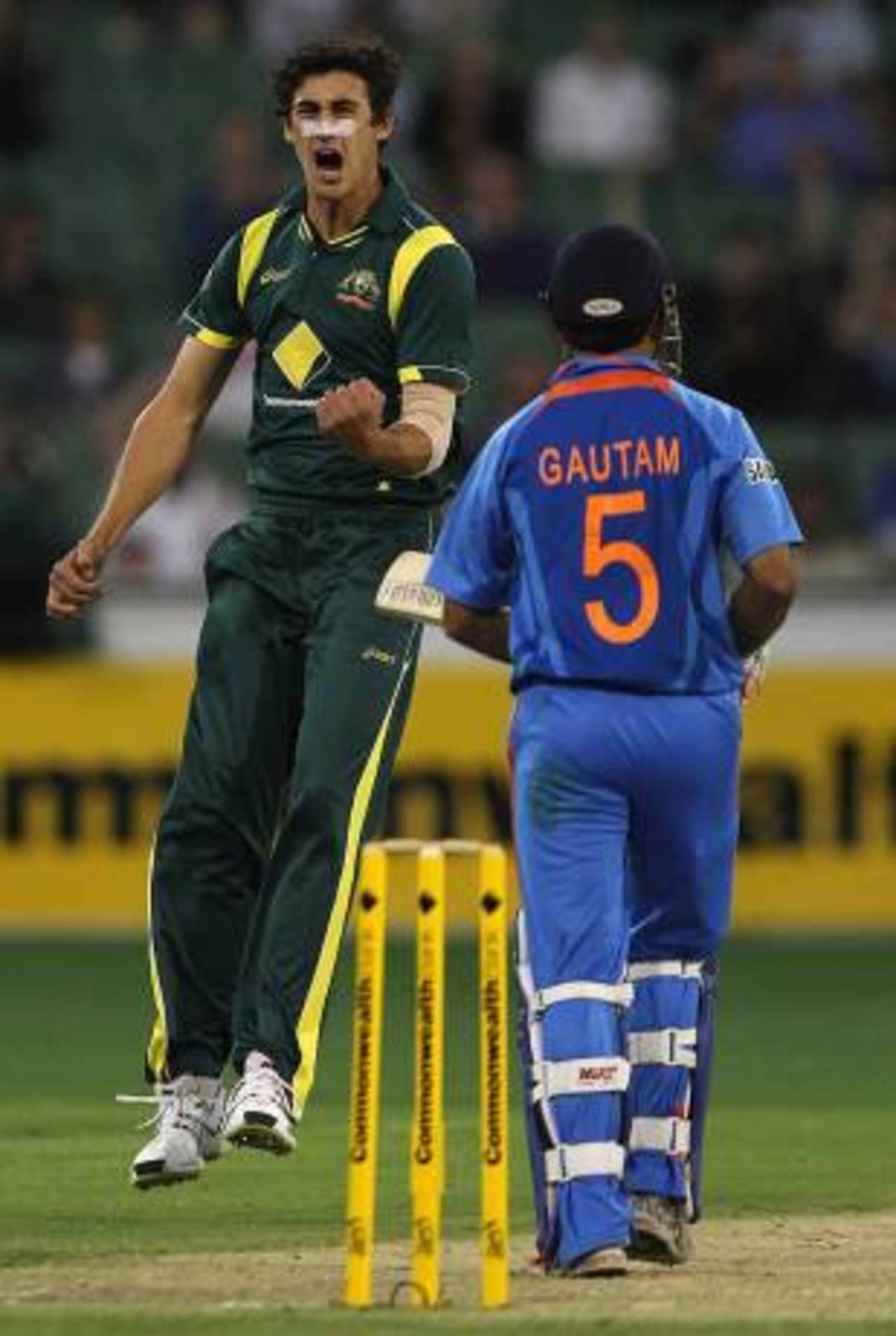Nothing irrelevant about it
The rivalry between India and Australia has acquired a considerable standing of its own. Australia could use this series to face their fears against spin
Abhishek Purohit
Oct 10, 2013, 8:45 AM

An India-Australia contest has always had a keen following in India • Getty Images
Relevance. Context. Meaning. As administrators continue to fill every small remaining opening in the calendar with more and more cricket, these words have come to be increasingly used by followers of the game. Even as the game tries to win new fans mostly through its chosen route, Twenty20, there is a growing section of existing ones who try to determine their interest in a series by searching for some relevance, context or meaning in it. Often, they are justified in their method, for some contests have long ago been done to death.
For instance, what context does the zillionth India-Sri Lanka bilateral ODI series have? Did the last-but-zillionth one have any meaning? Are such games between the two countries in danger of losing all relevance?
In the case of rivalries such as India-Pakistan or the Ashes, the history or tradition attached to the contest is so overpowering, that invariably there is no need to hunt for meaning. The rivalry between India and Australia, who are set to take each other on over seven ODIs and a T20, is nowhere close to India-Pakistan or the Ashes but over time has acquired a considerable standing of its own.
Little more than a decade ago, it wasn't too much of a rivalry, before the epic series in the Indian summer of 2001 ignited it. India-Australia match-ups suddenly acquired a certain needle, a certain spark. A reference point had been established, and both teams, one unquestionably great, one unquestionably competent, built on it. Gradually, the greatness evaporated, the competence waxed and waned. Still, India and Australia gave us some memorable games, such as the heart-stopping Mohali Test of 2010 and the pulsating quarter-final of the 2011 World Cup.
For all their recent struggles in Test matches, Australia's ODI record in India is still top-class. They won the World Cup here in 1987, and the Champions Trophy in 2006. They took bilateral series in 2007 and 2009 by identical 4-2 margins. When India routed them 4-0 in home Tests earlier this year, many celebrated it as a reprisal for the 0-4 humiliation Australia had subjected the visitors to on their own territory in 2011-12. While that attitude might not be in the interests of Indian cricket, the point is about the continued existence of the rivalry, and the way the country's fans have treated such games - television ratings for the 2009 bilateral ODI series comfortably exceeded those for the 2009 Champions Trophy. It is from this background that the ensuing series of seven ODIs to be inaugurated by a solitary T20 must be viewed.
There have been suggestions that this trip to India will only serve to destroy the confidence of Australia batsmen suspect against spin just before the return Ashes series. Granted that it is an Ashes year, and a double-Ashes one at that, such a conclusion appears to be alarmist. It is widely accepted that the current set of Australia batsmen aren't good players of slow bowling but how does avoiding your weakness contribute towards overcoming it, considering that must be the goal? Facing Indian spinners on benign one-day surfaces might not be a bad workout. In Tests, the proposition gets difficult with Indian pitches aiding spin much more. Phillip Hughes won't have forgotten his travails in India earlier this year, and if he can derive any kind of confidence from the current trip, it will only be an improvement. That can only help Australia, whose ODI outfit isn't exactly settled with the 2015 World Cup not too far away.
"What we have lost is a lot of experience," said George Bailey, leading the side in the absence of the unfit Michael Clarke. "We are trying to rebuild that. Guys are getting used to being in this side, being used to the scrutiny and pressure of international cricket, and to the different roles within the Australian side that they are playing."
An important such "different role" will be the mentoring one expected to be played by Shane Watson, who brings a wealth of limited-overs and subcontinent experience to this side, but is also someone who has been accused of hurting the cause of team unity.
For their part, India have kept renovating their one-day outfit, adding younger players in place of a few veterans, of whom only Yuvraj Singh has forced his way back for this series. Following an unexpected Champions Trophy win, the selectors experimented further in Zimbabwe. Two of the young fast bowlers who went to the African country, Jaydev Unadkat and Mohammed Shami, have found spots in the squad against Australia.
The indications have been promising, but how much India have progressed as an ODI unit will become clearer in this extended duel against an opponent who has regularly quelled them in their own conditions in the past. Just under a year ago, India lost to Pakistan, the only other team to have defeated them at home in a bilateral ODI series in the past decade. In that sense, Australia are fitting adversaries, and there is little irrelevance to this contest, which could see the No 1 ODI ranking change hands.
Abhishek Purohit is a sub-editor at ESPNcricinfo